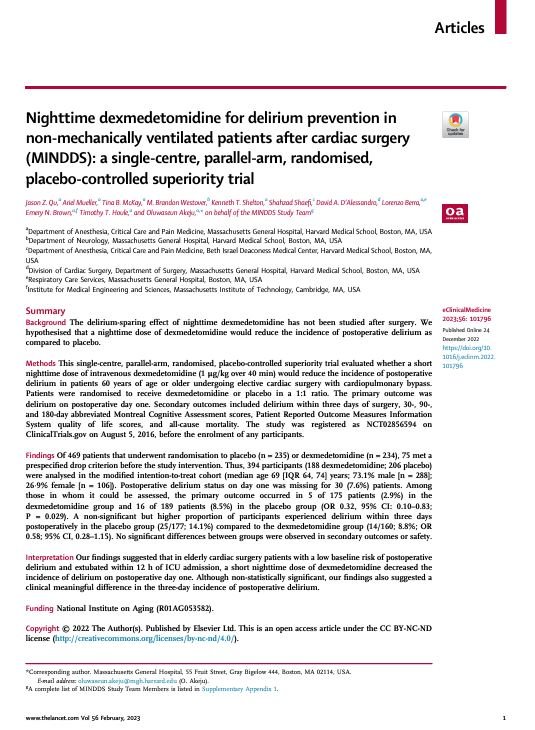Minimizing ICU Neurological Dysfunction with Dexmedetomidine-Induced Sleep (MINDDS II)
In this multicenter, randomized controlled trial, investigators aim to determine whether a nighttime dose of dexmedetomidine can prevent delirium, or the inattention and confusion that can sometimes happen after surgery.
Up to a third of elderly patients recovering from cardiac surgery experience postoperative delirium (POD), an acute state of confusion marked by inattention and changes in cognition. POD is a burdensome clinical and patient-centered outcome associated with long-term cognitive deficits like Alzheimer's Disease and Related Dementias (AD/RD), prolonged hospitalization, higher readmission rates, and increased mortality.
We recently found elevated tau in the serum of patients that developed POD after cardiac surgery and an association between tau and POD severity, suggesting that perioperative stressors exacerbate latent ADRD pathology, and evidence to suggest that dexmedetomidine modifies the association with preoperative tau. Recent studies have suggested that approximately 30% to 40% of POD may be preventable. However, multicomponent nonpharmacological POD prevention strategies are resource intensive and increasingly challenging to implement given the current labor shortage in healthcare.
At present, definitive guidelines or large clinical trials do not support the administration of any medication for POD prevention. In the pilot Minimizing ICU Neurological Dysfunction with Dexmedetomidine-induced Sleep (MINDDS) randomized controlled trial, we found that nighttime intravenous dexmedetomidine significantly reduced the incidence of POD in patients older than 60. However, replication in a large, more pragmatic trial is warranted to support the widespread implementation of nighttime dexmedetomidine for POD prevention.
This clinical trial will study nighttime intravenous and sublingual dexmedetomidine to provide definitive evidence for POD prevention efficacy. Additionally, it will create a biorepository to aid biomarker discovery and insights into POD and cognitive recovery after cardiac surgery.
Backed by compelling preliminary evidence, this large pragmatic trial has the potential to transform clinical practice, significantly reduce the morbidity and mortality associated with POD, and enable insights into mechanisms underlying cognitive decline after surgery. Further, given plausible bidirectional links, POD prevention may reduce the incidence of ADRD by delaying the progression of underlying vulnerabilities.
For more information about the MINDDS Study, please visit our About page.
The MINDDS II study represents one of the largest cardiac surgical studies of postoperative delirium ever conducted in the United States to date. More than 1800 patients will participate in the trial across 14 participating centers.


